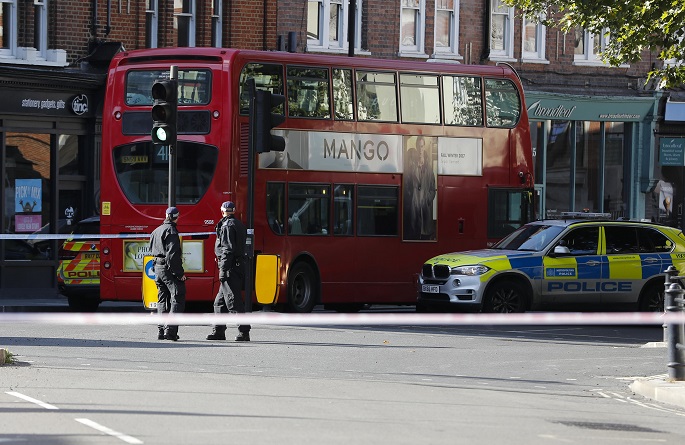London Tube line strike to spark misery for commuters
Published : 02 Oct 2018, 20:16
Hundreds of thousands of London Underground passengers face fresh disruption as drivers plan to stage a strike on Friday on the Central Line, the longest subway line in the British capital, the ASLEF train employees' union said Tuesday.
A second strike by Tube drivers on the line is also planned for Nov. 7.
Organized by Associated Society of Locomotive Engineers and Firemen members, the strike threatens to bring the line, which is used by more than 800,000 passengers a day, to a standstill.
The Central Line is a London Underground metro line that runs through central London, serving 49 stations over 46 miles (74 km).
Union leaders claim there is a "breakdown of industrial relations" in a long-running dispute with London Underground (LU) and accused Tube bosses of imposing "unsafe" working practices.
ASLEF's Underground organiser, said, "Industrial action is always the last resort but, given the intransigence of management on a whole range of issues affecting our members, we have, reluctantly, decided this is our only course of action."
"The strike on the Central Line is the result of management's failure to deal with the issues our reps have raised regarding service control problems affecting our members; abuse of the attendance at work procedure; breach of agreements regarding managers driving trains; abuse of the case conference procedure; harsh and unfair use of the disciplinary procedure; and imposition of new and unsafe 'flash and dash' working practices," Brennan said.
Drivers belonging to the rival RMT (National Union of Rail, Maritime and Transport Workers) union could refuse to cross picket lines, increasing the risk of no service over all or large parts of the line.
The strike follows four days of disruption on the Piccadilly Line last week by members of the RMT in a separate dispute, but the union also blamed a breakdown of industrial relations.
222
German gov't agrees on new migration law for skilled workers
The federal government of Germany has finalized the concept for a new migration law for skilled workers, German Social Democrat (SPD) leader Andrea Nahles announced on Tuesday.
Nahles said that the "cornerstones for skilled worker immigration from third countries (non- European Union countries, note)" would be presented to the cabinet on Tuesday after an agreement on the matter was reached during lengthy cabinet consultations. According to the German press agency (dpa), the legislation contains a compromise on the option of a so-called "change of lanes" between migrants' applications for humanitarian stay and regular work permits which has been debated within the "grand coalition" for several weeks.
"We will maintain the principle of separating asylum and economic migration," dpa cited a draft policy paper it has obtained as saying. At the same time, however, the document emphasized that the government would establish "clear criteria for a reliable status of tolerated (individuals) who derive their subsistence from gainful employment and are well integrated."
The news comes shortly after interior minister and Christian Social Union (CSU) leader Horst Seehofer announced on Monday that he had reached an agreement with labor minister Hubertus Heil (SPD) on the "foundation" for a related legislative overhaul. The resulting migration policy targeted by the "grand coalition" would enable certain types of asylum seekers to apply for a regular work visa after having failed to secure residency on humanitarian grounds.
"When (someone) cannot be deported due to compelling reasons, namely reasons which are not to do with the asylum seeker as a person, then people say let them work before they sit around," Seehofer said. He hereby referred to foreigners who are legally duty-bound to leave Germany but are tolerated by authorities there due to mitigating circumstances, for example the use of torture in their country of origin.
Labor minister Heil has argued that it is in Germany's interest to allow asylum seekers to stay who are well integrated into the local economy and society but have not received humanitarian stay. "We must not shoot ourselves in the foot out of ideological reasons by sending the wrong individuals back home", Heil told the press, echoing concerns voiced earlier by Daniel Guenther (CDU), governor of Schleswig-Holstein.
The agreement unveiled on Tuesday largely reflects the legislative focus of Seehofer's initial proposals. "Skilled workers from abroad already make an important contribution to the competitiveness of the German economy today," the draft policy paper obtained by dpa read. At the same time, German Chancellor Angela Merkel's (CDU) fourth governing cabinet lamented that Germany needed to become more successful in "attracting qualified workers from third countries."
Criteria which were named to determine whether residence in Germany will be granted to these skilled workers included "qualification, age, language skills, evidence of a concrete job offer and the financial ability to maintain a livelihood." Additionally, the government reserves itself the right to temporarily bar certain types of professions from obtaining a work visa in order to manage immigration in line with the demands of domestic companies.


